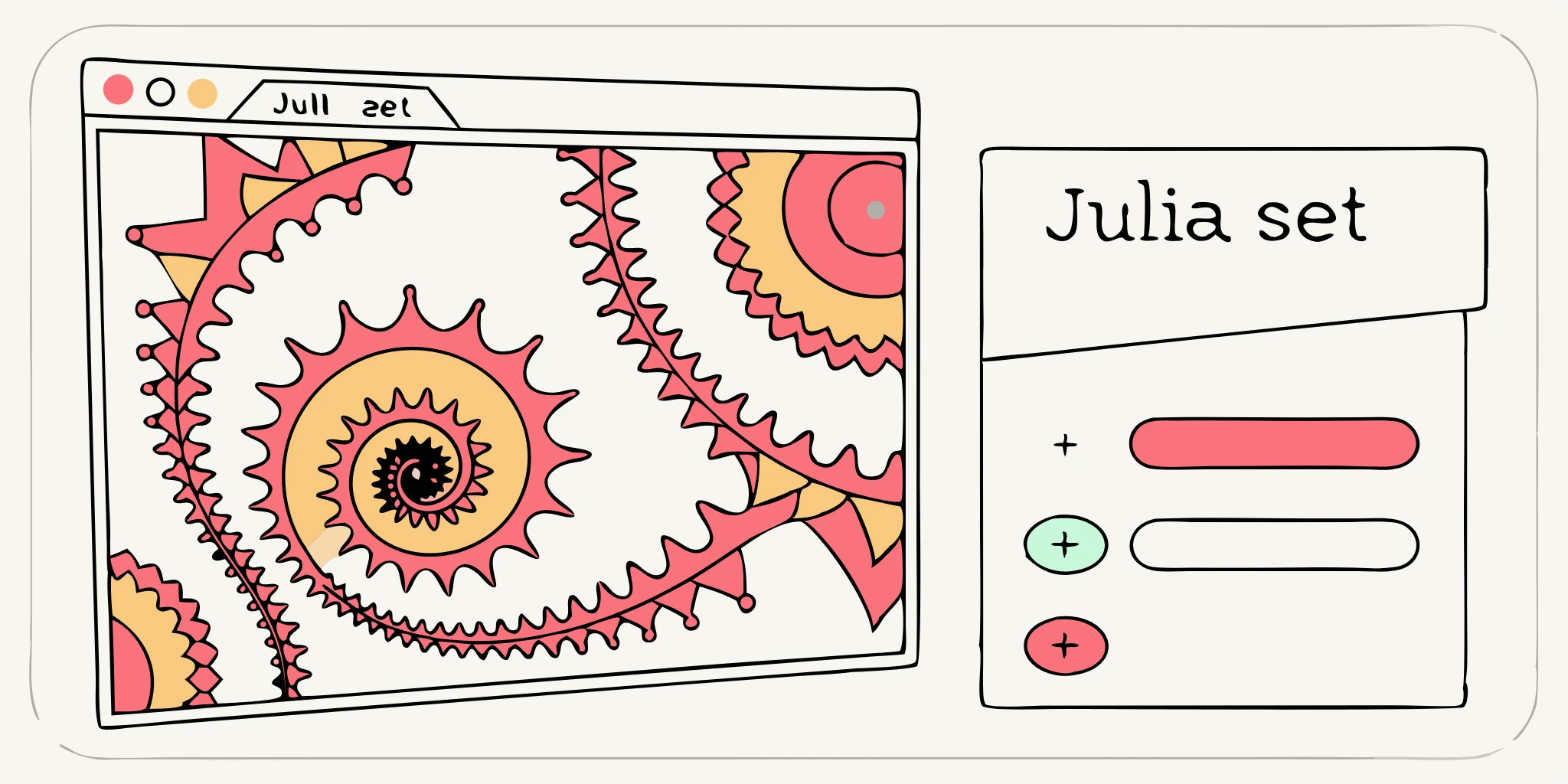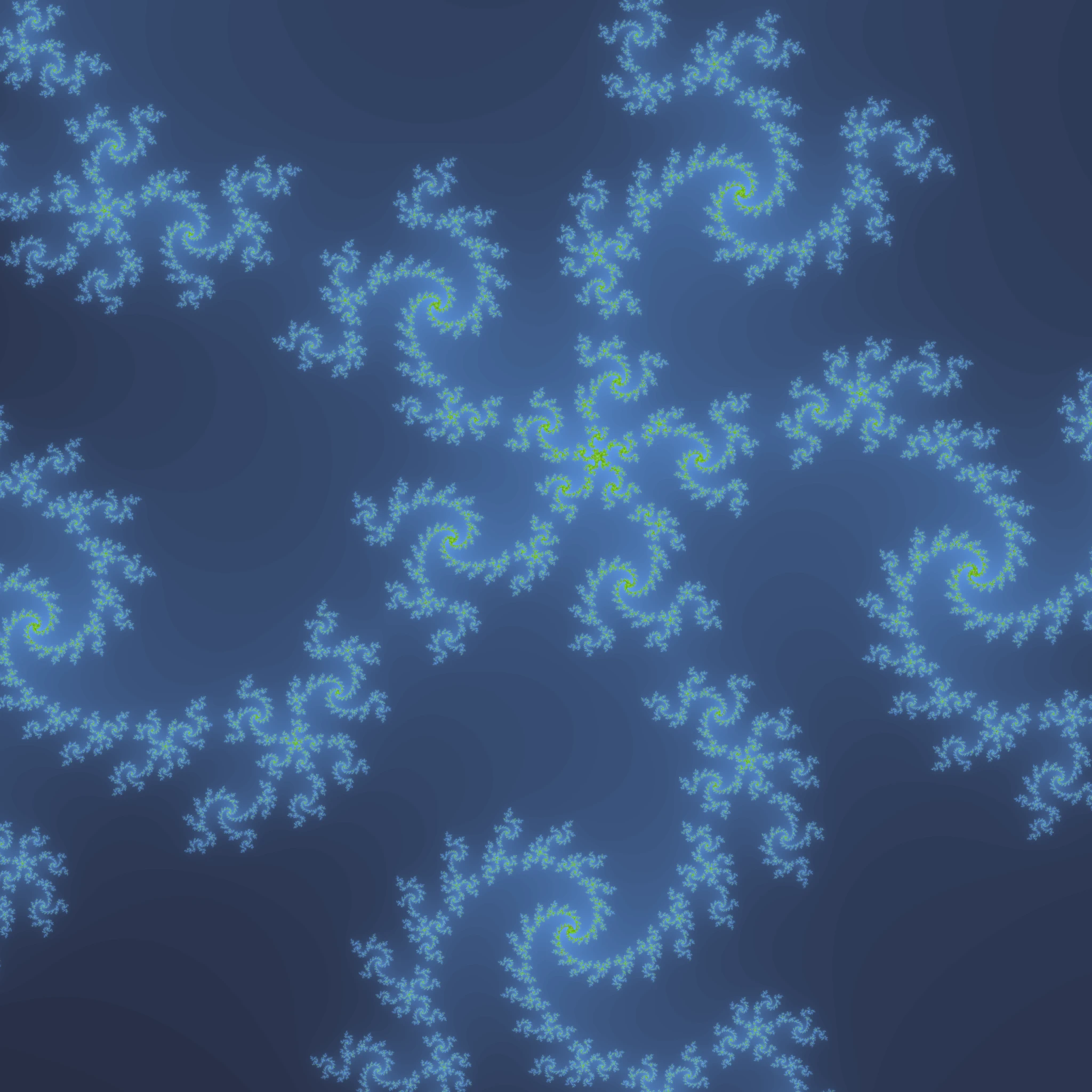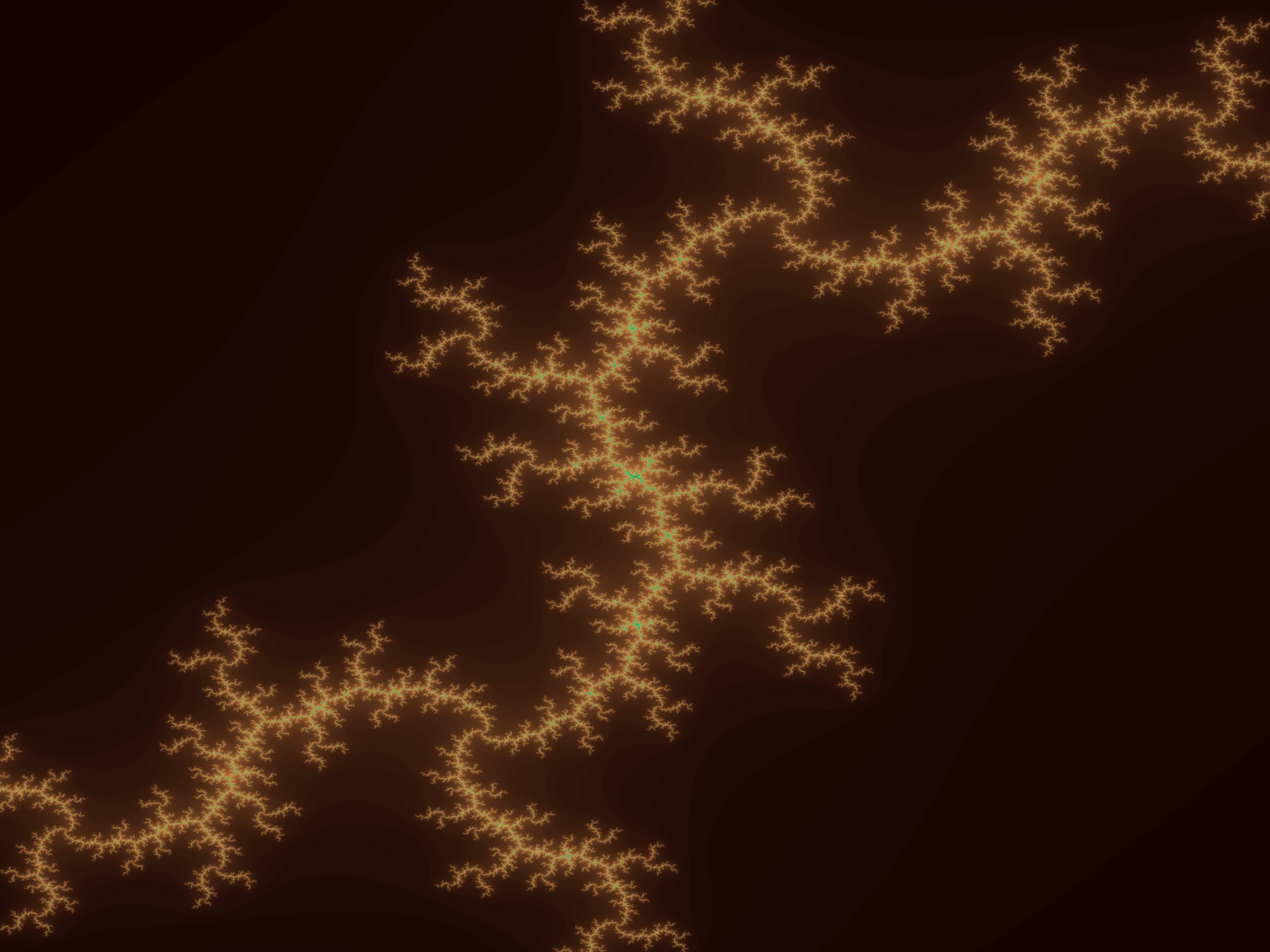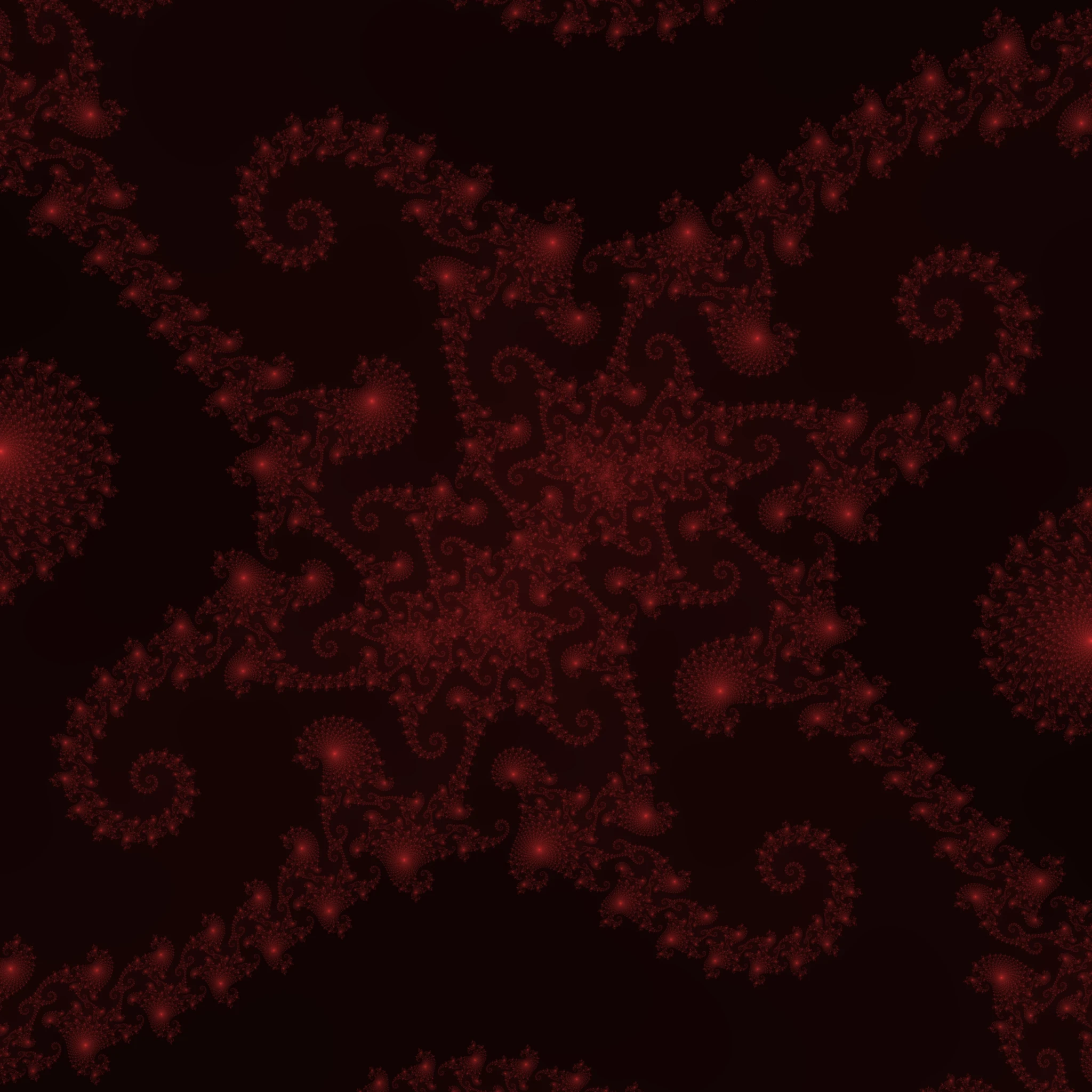Julia Set Fractals - Graphics with Ebiten Library in Go

1 Ebiten Library
Sometimes you need to visually represent some simulation or process.
The main requirements are support for the Go language, since calculations are done in Go, and ease of use.
Let’s look at ebiten, one of the most popular libraries for working with graphics.
The main use of ebiten is creating interactive 2D games.
We will use the library to draw some dynamic process.
2 Julia Set
As an example, let’s try to draw the Julia set.
The Julia set is described by the equation
where $ f(x) = z^2 + c, c \in \mathbb{C} $
For each point in the given region, find the iteration number at which the point begins to “escape” to infinity.
We won’t go deep into theory, as the main topic here is graphical capabilities.
3 Go Program
The main logic for calculating the color of points:
func generatePoints(toCenterX, toCenterY, toScaleX, toScaleY float64, width, height int) []Point {
points := make([]Point, 0, width*height)
var (
fromCenterX = float64(width) / 2
fromCenterY = float64(height) / 2
fromScaleX = float64(width) / 2
fromScaleY = float64(height) / 2
)
for x := range width {
for y := range height {
nx := remapPoint(float64(x), fromCenterX, fromScaleX, toCenterX, toScaleX)
ny := remapPoint(float64(y), fromCenterY, fromScaleY, toCenterY, toScaleY)
col := computeColor(nx, ny, maxIters, cCoeff)
points = append(points, Point{x, y, col})
}
}
return points
}
func remapPoint(x, fromCenter, fromScale, toCenter, toScale float64) float64 {
return (x-fromCenter)*(toScale/fromScale) + toCenter
}
func computeColor(x, y float64, maxIters int, c complex128) color.RGBA {
z := complex(x, y)
for i := range maxIters {
if cmplx.Abs(z) > 2 {
r := uint8((3*i + 17) % 0xFF)
g := uint8((2*i + 01) % 0xFF)
b := uint8((1*i + 01) % 0xFF)
return color.RGBA{r, g, b, 0xFF}
}
z = z*z + c
}
return color.RGBA{}
}I’m not sure how exactly the color of a point should depend on the number of iterations.
Since beautiful visualization is more important than mathematical accuracy here, I settled on this approach.
Implementation of the Game interface for use with ebiten:
type Game struct {
width int
height int
CenterX, CenterY float64
ScaleX, ScaleY float64
points []Point
needsUpdate bool
}
func (g *Game) Update() error {
g.handleInput()
if g.needsUpdate {
g.points = generatePoints(g.CenterX, g.CenterY, g.ScaleX, g.ScaleY, g.width, g.height)
g.needsUpdate = false
}
return nil
}
func (g *Game) Draw(screen *ebiten.Image) {
for _, p := range g.points {
screen.Set(p.X, p.Y, p.Color)
}
msg := fmt.Sprintf("TPS: %0.2f FPS: %0.2f\n", ebiten.ActualTPS(), ebiten.ActualFPS())
msg += fmt.Sprintf("Center: (%v,%v), Scale: (%v,%v)\n", g.CenterX, g.CenterY, g.ScaleX, g.ScaleY)
msg += fmt.Sprintf("maxIters: %v, cCoeff: %v\n", maxIters, cCoeff)
ebitenutil.DebugPrint(screen, msg)
}
func (g *Game) Layout(outsideWidth, outsideHeight int) (int, int) {
return outsideWidth, outsideHeight
}
func main() {
ebiten.SetWindowTitle("2D Fractal Viever - Demo - amyasnikov.com")
ebiten.SetWindowSize(screenWidth, screenHeight)
game := NewGame(screenWidth, screenHeight)
if err := ebiten.RunGame(game); err != nil {
log.Fatal(err)
}
}Keyboard controls:
func (g *Game) handleInput() {
const scaleStep = 0.3
if inpututil.IsKeyJustPressed(ebiten.KeyA) {
g.CenterX -= scaleStep * g.ScaleX
g.needsUpdate = true
}
if inpututil.IsKeyJustPressed(ebiten.KeyD) {
g.CenterX += scaleStep * g.ScaleX
g.needsUpdate = true
}
if inpututil.IsKeyJustPressed(ebiten.KeyW) {
g.CenterY -= scaleStep * g.ScaleY
g.needsUpdate = true
}
if inpututil.IsKeyJustPressed(ebiten.KeyS) {
g.CenterY += scaleStep * g.ScaleY
g.needsUpdate = true
}
if inpututil.IsKeyJustPressed(ebiten.KeyQ) {
g.ScaleX *= 1 + scaleStep
g.ScaleY *= 1 + scaleStep
g.needsUpdate = true
}
if inpututil.IsKeyJustPressed(ebiten.KeyE) {
g.ScaleX *= 1 - scaleStep
g.ScaleY *= 1 - scaleStep
g.needsUpdate = true
}
if inpututil.IsKeyJustPressed(ebiten.KeyU) {
g.needsUpdate = true
}
if inpututil.IsKeyJustPressed(ebiten.KeyP) {
log.Println("Saving image ...")
go func() {
if err := saveImage(g.CenterX, g.CenterY, g.ScaleX, g.ScaleY, g.width, g.height); err != nil {
log.Printf("Failed to save image: %v", err)
} else {
log.Printf("Image saved")
}
}()
}
if inpututil.IsKeyJustPressed(ebiten.KeyZ) {
os.Exit(0)
}
}It seemed to me that mapping points from one rectangular area to another rectangular area
is easiest when fixing the center of this area and the distances to the edges.
Then all operations of resizing, moving, and rendering are implemented very simply.
Saving a snapshot:
func saveImage(toCenterX, toCenterY, toScaleX, toScaleY float64, width, height int) error {
width *= scaleSaveImage
height *= scaleSaveImage
points := generatePoints(toCenterX, toCenterY, toScaleX, toScaleY, width, height)
img := image.NewRGBA(image.Rect(0, 0, width, height))
for _, p := range points {
img.Set(p.X, p.Y, p.Color)
}
filename := fmt.Sprintf("/tmp/fractal_%s.png", time.Now().Format("20060102-150405"))
file, err := os.Create(filename)
if err != nil {
return err
}
defer file.Close()
return png.Encode(file, img)
}Full code:
package main
import (
"fmt"
"image"
"image/color"
"image/png"
"log"
"math/cmplx"
"math/rand"
"os"
"time"
"github.com/hajimehoshi/ebiten/v2"
"github.com/hajimehoshi/ebiten/v2/ebitenutil"
"github.com/hajimehoshi/ebiten/v2/inpututil"
)
const (
screenWidth = 1024
screenHeight = 768
maxIters = 10000
scaleSaveImage = 5
animation = true
)
var (
// cCoeff = complex(-0.74543, 0.11301)
// cCoeff = complex(-0.8, 0.156)
// cCoeff = complex(0.285, 0.01)
// cCoeff = complex(-0.008, 0.71)
cCoeff = complex(-0.008, 0.85)
)
type Point struct {
X, Y int
Color color.RGBA
}
type ImageData struct {
Points []int
}
type Game struct {
width int
height int
CenterX, CenterY float64
ScaleX, ScaleY float64
points []Point
needsUpdate bool
}
func NewGame(width, height int) *Game {
g := &Game{
width: width,
height: height,
CenterX: 0,
CenterY: 0,
ScaleX: 1,
ScaleY: 1,
points: nil,
needsUpdate: true,
}
return g
}
func (g *Game) Update() error {
g.handleInput()
if animation {
r1 := 0.0003 * (2*rand.Float64() - 1)
r2 := 0.0003*(2*rand.Float64()-1) - 0.0001
cCoeff += complex(r1, r2)
g.needsUpdate = true
}
if g.needsUpdate {
// log.Println("Generating fractal...")
g.points = generatePoints(g.CenterX, g.CenterY, g.ScaleX, g.ScaleY, g.width, g.height)
g.needsUpdate = false
// log.Println("Fractal updated.")
}
return nil
}
func (g *Game) handleInput() {
const scaleStep = 0.3
if inpututil.IsKeyJustPressed(ebiten.KeyA) {
g.CenterX -= scaleStep * g.ScaleX
g.needsUpdate = true
}
if inpututil.IsKeyJustPressed(ebiten.KeyD) {
g.CenterX += scaleStep * g.ScaleX
g.needsUpdate = true
}
if inpututil.IsKeyJustPressed(ebiten.KeyW) {
g.CenterY -= scaleStep * g.ScaleY
g.needsUpdate = true
}
if inpututil.IsKeyJustPressed(ebiten.KeyS) {
g.CenterY += scaleStep * g.ScaleY
g.needsUpdate = true
}
if inpututil.IsKeyJustPressed(ebiten.KeyQ) {
g.ScaleX *= 1 + scaleStep
g.ScaleY *= 1 + scaleStep
g.needsUpdate = true
}
if inpututil.IsKeyJustPressed(ebiten.KeyE) {
g.ScaleX *= 1 - scaleStep
g.ScaleY *= 1 - scaleStep
g.needsUpdate = true
}
if inpututil.IsKeyJustPressed(ebiten.KeyU) {
g.needsUpdate = true
}
if inpututil.IsKeyJustPressed(ebiten.KeyP) {
log.Println("Saving image ...")
go func() {
if err := saveImage(g.CenterX, g.CenterY, g.ScaleX, g.ScaleY, g.width, g.height); err != nil {
log.Printf("Failed to save image: %v", err)
} else {
log.Printf("Image saved")
}
}()
}
if inpututil.IsKeyJustPressed(ebiten.KeyZ) {
os.Exit(0)
}
}
func saveImage(toCenterX, toCenterY, toScaleX, toScaleY float64, width, height int) error {
width *= scaleSaveImage
height *= scaleSaveImage
points := generatePoints(toCenterX, toCenterY, toScaleX, toScaleY, width, height)
img := image.NewRGBA(image.Rect(0, 0, width, height))
for _, p := range points {
img.Set(p.X, p.Y, p.Color)
}
filename := fmt.Sprintf("/tmp/fractal_%s.png", time.Now().Format("20060102-150405"))
file, err := os.Create(filename)
if err != nil {
return err
}
defer file.Close()
return png.Encode(file, img)
}
func generatePoints(toCenterX, toCenterY, toScaleX, toScaleY float64, width, height int) []Point {
points := make([]Point, 0, width*height)
var (
fromCenterX = float64(width) / 2
fromCenterY = float64(height) / 2
fromScaleX = float64(width) / 2
fromScaleY = float64(height) / 2
)
for x := range width {
for y := range height {
nx := remapPoint(float64(x), fromCenterX, fromScaleX, toCenterX, toScaleX)
ny := remapPoint(float64(y), fromCenterY, fromScaleY, toCenterY, toScaleY)
col := computeColor(nx, ny, maxIters, cCoeff)
points = append(points, Point{x, y, col})
}
}
return points
}
func (g *Game) Draw(screen *ebiten.Image) {
for _, p := range g.points {
screen.Set(p.X, p.Y, p.Color)
}
msg := fmt.Sprintf("TPS: %0.2f FPS: %0.2f\n", ebiten.ActualTPS(), ebiten.ActualFPS())
msg += fmt.Sprintf("Center: (%v,%v), Scale: (%v,%v)\n", g.CenterX, g.CenterY, g.ScaleX, g.ScaleY)
msg += fmt.Sprintf("maxIters: %v, cCoeff: %v\n", maxIters, cCoeff)
ebitenutil.DebugPrint(screen, msg)
}
func (g *Game) Layout(outsideWidth, outsideHeight int) (int, int) {
return outsideWidth, outsideHeight
}
func remapPoint(x, fromCenter, fromScale, toCenter, toScale float64) float64 {
return (x-fromCenter)*(toScale/fromScale) + toCenter
}
func computeColor(x, y float64, maxIters int, c complex128) color.RGBA {
z := complex(x, y)
for i := range maxIters {
if cmplx.Abs(z) > 2 {
r := uint8((3*i + 17) % 0xFF)
g := uint8((2*i + 01) % 0xFF)
b := uint8((1*i + 01) % 0xFF)
return color.RGBA{r, g, b, 0xFF}
}
z = z*z + c
}
return color.RGBA{}
}
func main() {
log.SetFlags(log.Lshortfile | log.Lmicroseconds)
ebiten.SetWindowTitle("2D Fractal Viever - Demo - amyasnikov.com")
ebiten.SetWindowSize(screenWidth, screenHeight)
game := NewGame(screenWidth, screenHeight)
if err := ebiten.RunGame(game); err != nil {
log.Fatal(err)
}
}4 Screenshots

julia-set-1

julia-set-2

julia-set-3
5 Video
The Julia set changes as the parameter c in the equation changes.

